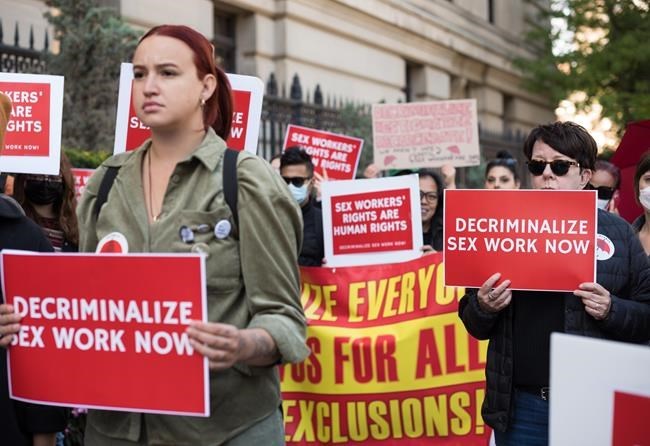OTTAWA — Canada's prostitution laws prevent sex workers from obtaining meaningful consent before engaging with clients, a lawyer for an alliance of sex worker rights groups argued in a Toronto courtroom Monday.
The hearing is the first of what is expected to be four days of arguments at the Ontario Superior Courtduring a constitutional challenge of the Protection of Communities and Exploited Persons Act.
That law was passed by the former Conservative government in 2014, about a year after the Supreme Court of Canada struck down the previous law that prohibited prostitution. In that case, lawyers argued existing provisions were disproportionate, overbroad and put sex workers at risk of harm.
The Canadian Alliance for Sex Work Law Reform is now arguing the new laws are more restrictive than what they replaced and continue to criminalize sex work.
It says the new laws foster stigma, invite targeted violence and remove safe consent.
Michael Rosenberg said in court Monday that the laws making it illegal to advertise or communicate about buying or selling sexual services are "unacceptably dangerous," in part because they prevent health and safety checks, or meaningful conversations about consent, from happening.
“They should be able to have a discussion about consent that is legal and they can't have that discussion … within the bounds of (the law),” he said. “If they do anyways, someone is willing to break the law, that’s no good. And more often than not, they don’t have (consent) because of the law. That’s no good either.”
The alliance also argues the new laws violate the Charter of Rights and Freedoms.
Jenn Clamen, a co-ordinator for the group, says it has a robust evidentiary record to lay out before the judge over four days of hearings this week.
”It does demonstrate the harms for all sex workers," she said in an interview. "The most marginalized sex workers suffer the brunt, but all sex workers, even the most privileged sex workers, are harmed by the current legislative regime."
She also said the laws force sex workers, and people working with them, to operate in the context of criminalization.
“That means sex workers, clients and third parties … are at any given moment always trying to avoid detection by law enforcement and police,” she said. “What that means is sex workers are currently and always forced into isolation because of the risk of criminalization.”
The alliance says there shouldn't be any criminal laws specific to sex work, and it has dozens of recommendations to create a more regulated industry.
The Canadian Alliance for Sex Work Law Reform formed in 2012 and includes 25 sex-worker organizations across Canada.
This report by The Canadian Press was first published Oct. 3, 2022.
David Fraser, The Canadian Press



